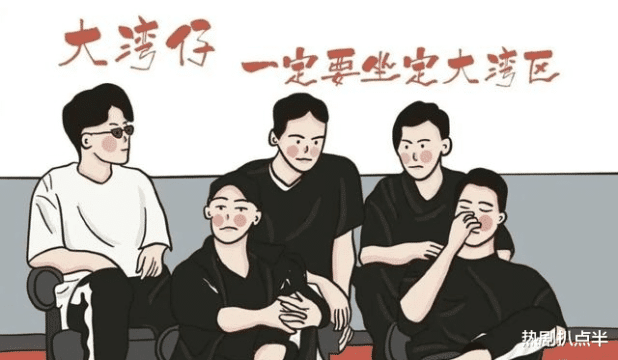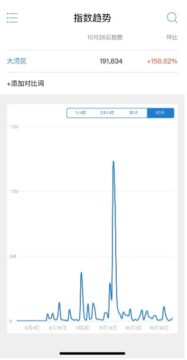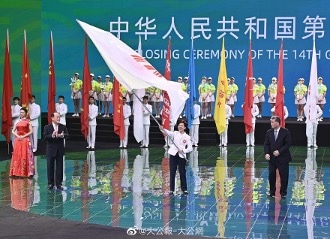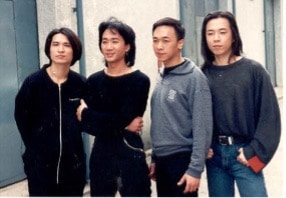Produced by Mango TV, the Chinese all-male variety show Call Me By Fire (披荆斩棘的哥哥) has concluded its super successful first season. With the last episode airing on October 29 of 2021, the show, starring 33 male celebrities, has brought some well-known Hong Kong actors and singers back into the spotlight in mainland China. On social media, they’ve been nicknamed “The Greater Bay Area Brothers” (“大湾区哥哥”) or “The Group of Greater Bay Area” (“大湾区组”).
The Greater Bay Area, also known as ‘Guangdong-Hong Kong-Macao Greater Bay Area’ (粤港澳大湾区) refers to the Chinese government’s scheme to link the cities of Hong Kong, Macau, and some cities in Guangdong Province including Guangzhou, Shenzhen, Zhuhai, Foshan, Zhongshan, Dongguan, Huizhou, Jiangmen, and Zhaoqing, into one major integrated economic and business hub.
In the Call Me By Fire variety show, male celebrities who’ve since long been active in the entertainment industry are competing to form a performance group. The five actors/singers from Hong Kong, including Chen Xiaochun (陈小春/Chan Siu Chun), Zhang Zhilin (张智霖/Cheung Chi-lam), Xie Tianhua (谢天华/Tse Tin-wah), Lin Xiaofeng (林晓峰/Lamb Hiu-fung) and Liang Hanwen (梁汉文/Leung Hon-man), have been in one group together ever since the first episode of the popular reality show.

(Zhang Zhilin, Lin Xiaofeng, Xie Tianhua, Chen Xiaochun, Liang Hanwen)
When group member Xie joked about their ‘too relaxed’ attitude in the first episode – while other people were busy practicing, – he referred to their group as “The Greater Bay Guys” (“大湾仔”). This seeded the concept to the audience, who adopted the term to refer to the team.

Illustration of The Greater Bay Guys, source http://dianyingfengyun.com/
On Chinese social media, the five Cantonese-speaking artists of the group then started to go viral as “The Greater Bay Area Brothers” (大湾区哥哥). Other Cantonese-speaking artists in the show including Huang Guanzhong (黄贯中/Wong Koon-chung) and Ouyang Jin (欧阳靖/Jin Au-Yeung aka MC Jin) also came to be regarded as ‘extra’ members of the group.
Various social media users call the success of the Greater Bay Brothers a sign of a greater “Hong Kong Music Revival” (“港乐复兴”). But the trend goes beyond music alone, as actors and comedians from Hong Kong are also increasingly moving to the mainland industry.
“The Greater Bay” Goes Trending
Recently. the the “Greater Bay Area” (大湾区) term was added to numerous Weibo hashtags relating to the show, garnering many views. Some examples:
- “The Aim of the Greater Bay Area Five is to Be Bigger and Stronger” (#大湾区五人组的目标是做大做强#)– 60 million views
- “The Five of the Greater Bay Area Are Soo Hilarious” (#被大湾区五人组笑死#) – 210 million views
- “All Members of the Greater Bay Area Team Act like They Have Social Phobia: (#大湾区全体社恐#) – 230 million views
- “LOL for the Greater Bay Area Team Choosing New Members” (#被大湾区选人笑死#) – 190 million views
- “LOL for the Greater Bay Area Team Speaking Mandarin” (#被大湾区的普通话笑死#) – 240 million views
- “Cantonese Rap by the Greater Bay Area Team” (#大湾区唱的粤语rap#) – 190 million views
- “The Water Stage of the Greater Bay Area Team Is Just So Cool” (#大湾区水舞台太酷了#) – 130 million views
- “The Greater Bay Area Brothers Recreate Iconic Scenes of the Show” (#大湾区哥哥再现名场面#) – 110 million views
The official data analysis tool of Sina Weibo, the Weibo Index (@微指数), shows that from August 12, when the first episode of the show aired, the trend volume for the “Greater Bay Area” (大湾区) started to peak.
Besides the Call Me By Fire show, other news about the Greater Bay area also contributed to this peak.

On August 26, the General Office of the State Council of the People’s Republic of China announced that Guangdong Province, Hong Kong, and Macau would host the 2025 National Games of China together.
Following the announcement on the closing ceremony of the 14th National Games of China in Xi’an, netizens made the Chief Executive of Hong Kong, Carrie Lam, go to the top trending lists with the hashtag “Carrie Lam Accepts the Flag of National Games of China” (#林郑月娥接过全运会会旗#) which received more than 100 million views.
Along with the hashtag created for Lam, another hashtag about the announcement using the ‘Greater Bay Area’ term also went trending that day and received more than 170 million views (“2025 National Games to Be Held in the Greater Bay Area” #2025全运会将在大湾区举办#).

The recent social media trend peak for ‘Greater Bay Area’ occurred on September 21, the night of the Mid-Autumn Festival, when a concert was simultaneously held in Shenzhen (main venue) and Hong Kong (sub-venue). The concert was live-streamed on national platforms and shown in Hong Kong by public broadcasters. The hashtag of the concert, “The Full Moon Rises in the Great Bay Area” (#湾区升明月#), received over 1.38 billion (!) views.
The ‘Greater Bay Brothers’ were also invited to perform at the concert, along with many other singers from mainland China, Hong Kong, Macau, and Taiwan. More than one-third of the songs performed at the concert were in Cantonese. A Hong Kong movies montage of clips also quickly went viral on Weibo, leading Chinese netizens to share memories of watching these movies again and again.
All of these recent trending topics show how much Cantonese songs and movies resonate with netizens in mainland China. Especially for those born in the 1970-1990 era, Hong Kong popular culture has become a part of their childhood memories.
Finding Renewed Success in the Mainland
The five members of the Greater Bay Group in Call Me By Fire and its extra Cantonese-speaking members are mostly known by the mainland audience because of their songs or for the drama series or films they starred in.
For example, Huang Guanzhong is known as a member of the legendary band Beyond, while Chen Xiaochun became popular because of his role as Wei Xiaobao (韦小宝) in the TV drama The Deer and the Cauldron (鹿鼎记), and for playing “Chicken” Chiu (山鸡哥) in the Young and Dangerous film series (古惑仔系列电影). His songs, Heartless You (算你恨) and Exclusive Memory (独家记忆) were also very popular in mainland China in the early 2000s.
Zhang Zhilin is widely known by audiences in mainland China due to his role in The Legend of the Condor Heroes (射雕英雄传) produced by TVB in 1994. Other TV dramas such as Return of the Cuckoo (十月初五的月光) and Triumph in the Skies II (冲上云霄2) further boosted his popularity in the mainland.

The legendary band Beyond, the first one on the right is Huang Guanzhong.

Chen Xiaochun in “The Deer and the Cauldron” as Wei Xiaobao, and in the “Young and Dangerous” Film Series as “Chicken” Chiu.

Zhang Zhilin in “The Legend of the Condor Heroes” as Guo Jing (郭靖), and in the “Triumph in the Skies II” as Captain Cool.
There was a time when singers or actors in mainland China, including the two other Greater Bay Area Brothers Zhao Wenzhuo (赵文卓) and Zhang Jin (张晋), would move to Hong Kong for better career development. Along with the fast developments of the entertainment industry in mainland China, things have changed. Some Hong Kong artists have now begun to shift their career focus to mainland China.
One example is the Hong Kong actress Sheh Shiman (佘诗曼, also known as Charmaine Sheh), who started her career by winning second runner-up in the 1997 Miss Hong Kong pageant. She stood out for her roles in Return of the Cuckoo in 2000 (partnering with Zhang Zhilin) and War and Beauty (金枝欲孽) in 2004.

Sheh Shiman and Zhang Zhilin in Return of the Cuckoo.
In 2011, Sheh decided not to renew her long-term contract with TVB, and started to focus more on acting in TV dramas in mainland China. In 2018, she starred in the hugely popular The Story of Yanxi Palace and gained many fans in the mainland for her acting skills. She was also nominated for Best Supporting Actress at the 24th Huading Awards – China’s equivalent to the American People’s Choice Awards.

Sheh Shiman in the Story of Yanxi Palace.
Another example of a Hong Kong entertainer achieving new career success in mainland China is Wang Zulan (王祖蓝/Wong Cho-lam). As a comedian, Wang has been participating in various variety shows. He is well known by the mainland audience for impersonating different celebrities or story characters.

In March 2018, a group of senior Hong Kong artists set up the Association for Betterment of Hong Kong’s Entertainment Industry in Mainland China (HKEIMC) in Hong Kong in the hope of becoming a bridge between the mainland and Hong Kong, Macau, and promoting more exchanges and cooperation within the entertainment industry.
The HKEIMC also aims to help the development of Hong Kong and Macao artists in mainland China, with Jacky Chan (成龙) as the chairman and Zeng Zhiwei (曾志伟/Tsang Chi Wai) as the executive chairman.
Talking about the founding of HKEIMC, Vice President Wang Mingquan (汪明荃/Wang Ming-chun) said that most of the local residents in the Greater Bay Area already communicate in Cantonese and watch Hong Kong TV programs, suggesting that the cultural differences are relatively small and that there is more room for cooperation.
The entertainment industry in Hong Kong has recently shown more signs of moving to the mainland. Earlier in 2021, for example, Emperor Entertainment Group (EEG), one of the largest entertainment groups in Hong Kong, announced the opening of its Greater Bay Area headquarter office in Guangzhou.
More Greater Bay Coming to China’s Mainstream Entertainment
As Call Me By Fire has geared up the audience’s huge interest in the Greater Bay Area, it is reported that a new variety show featuring the five brothers of the Greater Bay Area named Nights of the Greater Bay Guys (大湾仔的夜) has already started filming.
In addition, audiences interested in Cantonese songs can also expect a new singing show which will be co-produced by Mango TV and TVB. The producer of the show, Wang Zulan, said in a recent interview that he will bring his ten years of experience in the mainland back to Hong Kong and the Greater Bay Area at large.
All of these recent developments are signs of a more flourishing future for the entertainment industry in mainland China, presenting more job opportunities for artists from Hong Kong.
“As Hong Kong singers are gathering in mainland variety shows and the Greater Bay Brothers are now going viral across the country, is this the 2021 beginning of the great ‘Cantopop’ revival?”, some Weibo users wonder. It may very well be.
By Wendy Huang
Follow @whatsonweibo
Spotted a mistake or want to add something? Please let us know in comments below or email us. Please note that your comment below will need to be manually approved if you’re a first-time poster here.
©2021 Whatsonweibo. All rights reserved. Do not reproduce our content without permission – you can contact us at info@whatsonweibo.com
The post Hong Kong Stars Shine in Call Me By Fire: ‘Greater Bay Area Brothers’ Go Viral on Chinese Social Media appeared first on What's on Weibo.